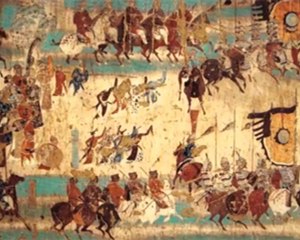So why did he bother? The reason was simple. Kublai didn't just want to make the Song submit. He wanted to reunify China.
那么他为什么要费这个劲儿呢?原因很简单:忽必烈不只是想让宋朝屈服,他想统一中国。
Prior to Kublai Khan, the last time China had been unified had been under the Tang Dynasty, who'd fallen 360 years before.
在忽必烈之前,中国最后一次统一是在唐朝的统治下,而唐朝已经灭亡了360年。
To give you some idea of how ridiculously long ago that was, traveling back in time 360 years from today would land you in 1660.
为了让你知道那是多么遥远的事情,带你穿越360年回到1660年。
In 1660, Oliver Cromwell had only just died. New York was still New Amsterdam. Louis XIV was on the French throne.
1660年,奥利弗·克伦威尔刚刚去世,纽约还是新阿姆斯特丹,法国国王是路易十四。
Kublai's dream of reuniting China was like you meeting someone today who dreams of returning the Thirteen Colonies to England.
忽必烈统一中国的梦想就像某人梦想着把十三殖民地归还给英国一样。
It was mad, laughable. It was also something he totally succeeded at.
这是疯狂的、可笑的,也是他的大胜所在。
By 1271, Kublai had established a new capital at modern-day Beijing, and renamed his empire in the Chinese style, declaring it the Yuan Dynasty.
到了1271年,忽必烈在现在的北京建立了新的都城,并按照中国的风格将帝国改名为元朝。
By the mid-1270s, Song generals were defecting, swearing allegiance to the new Yuan emperor.
到了12世纪70年代中期,宋朝的将军们纷纷叛逃,宣誓效忠元朝。
At last, on March 28, 1276, the boy emperor of the Song was captured and taken as prisoner to Beijing.
最后,在1276年3月28日,宋朝的小皇帝被俘并被带到北京。
Although Song loyalists would fight on for three more years, the writing was on the wall.
虽然忠于宋朝的人继续战斗了三年多,但不祥之灾已成定局。
The final end came on March 19, 1279. On that day, a titanic naval battle took place near modern Macu.
1279年3月19日,战争终于结束了。那一天,在现代的马库附近发生了一场巨大的海战。
When it was finally over, there was no-one left to oppose Kublai Khan.
当战争最后结束时,已经没有人可以反对忽必烈了。
Aged 63, the great Khan had at last finished his brother's work. China was now conquered, reunified, and at the mercy of the Mongols.
63岁,伟大的可汗终于完成了他哥哥的工作,中国被征服了,统一了,在蒙古人的统治之下。
Only, the other Mongols didn't quite see it that way.
只是,其他蒙古人并不这么看。
In the course of the conquest, Kublai's Yuan Dynasty had begun to take on more and more Chinese characteristics, until it seemed completely alien.
在征服的过程中,忽必烈的元朝开始有越来越多的中国特色,直到最后完全变得陌生。
No-one knew what was coming next, but they may have agreed on one thing.
没有人知道接下来会发生什么,但他们在一件事上达成了一致。
Whatever form Yuan rule took, it certainly wasn't going to be Mongol in nature.
即无论元朝采取何种统治方式,本质上都肯定不会是蒙古式的统治方式。
A Traveller from an Antique Land In 1275, three bedraggled men arrived at Kublai's Khan's vast marble palace.
1275年,三个衣衫褴褛的人来到忽必烈宏伟的大理石宫殿。
They came from the distant city of Venice, over 7,500 km away.
他们来自7500公里外的遥远城市威尼斯。

The older two were merchants, while the younger was a lad of barely twenty with a gift for languages.
年长的两个是商人,而年轻的是一个只有20岁、有着语言天赋的孩子。
They'd come intending only to stay a short while. But when the Khan saw them, he was so impressed with the youngest that he made them stay for 16 whole years.
他们来的时候没打算久留。但当可汗看到他们时,他对那个最小的孩子印象深刻,他让他们在这里住了整整16年。
The name of that young man? As you've already guessed, it was Marco Polo.
而那个年轻人叫什么名字呢?你大概已经猜到了,他就是“马可波罗”。
And it's his account of Kublai's court that still forms the basis of how we see the Yuan Dynasty.
他对忽必烈朝廷的描述仍是我们对元朝印象的基础。
By the time Polo presented himself to the great Khan, the growing empire was already in full swing.
当马可波罗向伟大的可汗觐见时,这个不断壮大的帝国已经处于鼎盛时期。
Under the Yuan, China entered a period of incredible prosperity, but one that wasn't quite the uncomplicated picture of perfection that Polo painted.
在元朝的统治下,中国进入了令人难以置信的繁荣时期,但并不像马可波罗所描绘的那样完美。
On the good side, Kublai was a ruler who was seriously into innovation.
从好的方面来说,忽必烈是一个非常热衷于创新的统治者。
Under his watch, everything from an empire-wide postal service to the issuing of paper money was established.
在他的监督下,从整个帝国范围内的邮政服务到纸币的发行,一切都建立了起来。
But Yuan China wasn't just about physical improvements. Kublai was also a leader in innovative thinking. Freedom of religion was embraced.
不过元朝改善的并不仅仅是物质方面,忽必烈还是创新思维的领导者,宗教自由受到了拥护。
Any language from around the empire was permitted at court, and Kublai even hired a team to create an artificial language which would bind his subjects together - although this never caught on.
朝廷允许使用任何来自帝国各地的语言,忽必烈甚至雇佣了一个团队来创造一种人工语言来将他的臣民联系在一起——尽管这种语言始终未流行起来。
There were scientific advances, too. Kublai had accurate maps made of China, established institutes of medicine, and improved the calendar.
科学上也有进步。忽必烈绘制了精确的中国地图,建立了医学研究所,改进了历法。
He also turned Chinese society on its head.
他还颠覆了中国社会。
Under the Song, artisans and doctors had been discriminated against as useless idiots who spent time doing stuff with their hands rather than refining their minds with Confucian poetry.
在宋朝时期,工匠和医生被歧视为无用的白痴,他们花时间用自己的双手做事,而不是用儒家的诗歌来精炼自己的思想。
But Kublai flipped that. He handed artisans enormous tax breaks, promoted doctors and astronomers.
但忽必烈却反其道而行之。他给工匠们提供了巨大的税收减免,提拔了医生和天文学家。
The result was an economic boom that dragged reunified China into the new era.
其结果是经济繁荣,将统一的中国拉进了新时代。
But Kublai's outward successes masked some deeper failures.
但忽必烈表面上的成功掩盖了一些更深层次的失败。
One was a state policy of racial discrimination.
一是国家的种族歧视政策。
While Kublai played the part of the Chinese emperor, wearing traditional robes and allowing himself to be carried around by servants, the reality was that his China was deeply discriminatory towards Chinese.
忽必烈扮演的是中国皇帝的角色,穿着传统的长袍,允许仆人带着他到处走,但现实是,他统治下的中国对中国人有着严重的歧视。
The Yuan had four social classes. At the top were Mongols, who held all the key posts.
元朝有四个社会阶层:处于顶端的是蒙古人,他们掌握着所有的关键职位。
Second were useful foreigners, like Marco Polo or the Khan's Muslim treasurers.
其次是有用的外国人,如马可波罗或可汗的穆斯林司库。
Third were northern Chinese, who shouldered a heavy tax burden.
第三是背负着沉重税负的北方人。
And fourth were the southern Chinese, who were considered lower than vermin.
第四是中国南方人,他们被认为比害虫还臭。
The result was millions of Chinse crushed by taxes, and treated like strangers in their own land.
结果是数百万中国人被税收压死,在自己的土地上被当作陌生人对待。
On a personal level, too, Kublai wasn't quite the serene emperor of popular imagination.
在个人层面上,忽必烈也并不是大众想象中的安详的皇帝。












